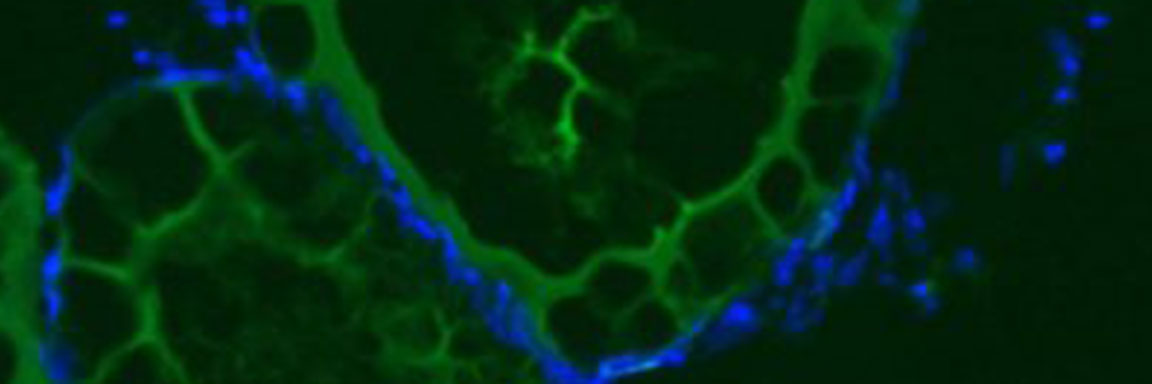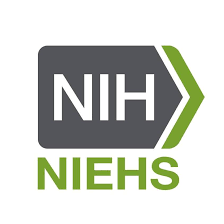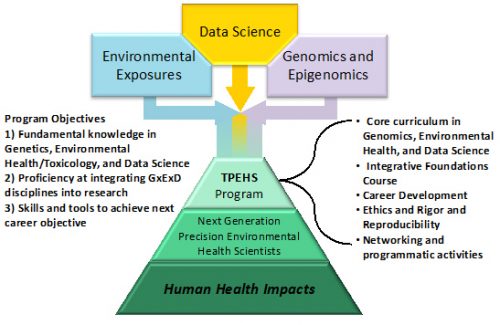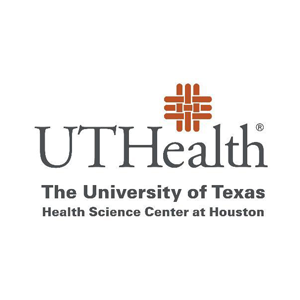
Precision Environmental Health Sciences (TPEHS)

Funded by the National Institute of Environmental Health Sciences, T32 ES027801.
Program Director:
Cheryl Lyn Walker, PhD, Director, Center for Precision Environmental Health Professor, Molecular & Cell Biology, and Medicine, Baylor College of Medicine
Program Co-Directors:
Daniel Gorelick, PhD, Associate Professor, Molecular and Cellular Biology, Baylor College of Medicine
Craig Hanis, PhD, Professor, Epidemiology, Human Genetics & Environmental Sciences, and Human Genetics Center School of Public Health, UT Health Science Center at Houston
Swathi Arur, PhD, Professor, Genetics, MD Anderson Cancer Center
Program Administrators:
Karen Ethun, Executive Director, Gulf Coast Consortia/Keck Center
Elizabeth Lawrence, Program Administrator, Gulf Coast Consortia
Click Here for more information about the Center for Precision Environmental Health (CPEH).
The goal of the interdisciplinary Training in Precision Environmental Health Sciences (TPEHS) is to train the next generation of environmental health scientists working at the interface of genetics, environmental health and data science (GxExD). Historically, training in these disciplines has been siloed, and few researchers have the training needed to incorporate all three into today’s precision environmental health research. The TPEHS is designed to meet the need for this interdisciplinary training by preparing the next generation of environmental health science (EHS) researchers to make important research advances and improve our understanding of the environment influences on health and disease.
Program Director Cheryl Walker, PhD, and three Co-PDs — Swathi Arur (Genetics), Daniel Gorelick (Environmental Health) and Craig Hanis (Data Science) — provide leadership for the program and expertise in GxExD research. The Training Plan has been designed to meet TPEHS Program Objectives for trainees to:
1) Acquire fundamental knowledge in Genetics, Environmental Health, and Data Science; 2) Become proficient at integrating concepts of GxExD into their research; and 3) Gain the necessary skills and tools to leverage TPEHS training to achieve their next career objective.

A Core Curriculum for PhD students includes didactic coursework to acquire competencies in Environmental Health/Toxicology, Genetics, and Data Science in Year 1, and a Foundations Course on Integrative Concepts of Precision Environmental Health in Year 2; postdoctoral trainees audit this course in their first year in the Program. This didactic training is complemented by Career Development activities (including an Individual Development Plan), training in Responsible Conduct of Research (ethics, rigor and reproducibility) and programmatic/networking opportunities (including peer-to-peer mentoring) that enhance the training environment and build cohesion among trainees. For postdoctoral trainees, this includes the opportunity for industry-based internships with the Health and Environmental Sciences Institute (HESI) and/or preparation for academic careers via grant-writing workshops and submission of a K99/R00 application.
The Center for Precision Environmental Health (CPEH), created in 2016 with Dr. Cheryl Walker as its founding and current Director, was established to understand causes of disease through research at the intersection of genetics, environmental health and computational biology. The goal of the CPEH is to increase our understanding of how our environment influences health and risk for disease. It will focus on how early life exposures to certain environmental factors permanently change the body’s physiological processes to increase risk for cancer and metabolic diseases. CPEH, located on the 13th floor of BCM’s Alkek Building, provides an additional home base for TPEHS.
Overview: The need for Training in Precision Environmental Health.
The Training in Precision Environment Health Sciences (TPEHS) Program has fostered multi-disciplinary training at the intersection of Genomics/Epigenomics (G), Environmental Health (E) and Data Science (D). This GxExD training is designed to meet the needs for tomorrow’s Precision Environmental Health workforce. Human health is determined by interactions between our environment, genome and epigenome, which shape the transcriptomic, proteomic, and metabolomic landscape of cells and tissues. Precision Environmental Health is an emerging field leveraging these system-level (‘omic) and environmental data to understand underlying environmental causes of disease, risk at the level of the individual, and identify new prevention and intervention strategies. Precision Environmental Health research holds promise for filling key knowledge gaps such as how to assess the “exposome”, the genomic/epigenomic basis and mechanisms responsible for environmental disease, how other host factors such as age, physiology and lifestyle modify disease susceptibility. Precision Environmental Health researchers of the future will use increasingly large and complex “omics” data sets to fill these knowledge gaps and move the field from a population-level understanding of environmental causes of disease to characterizing individual disease risk, and development of precise prevention and intervention strategies.
The need to train tomorrow’s Precision Environmental Health researchers was pointed out in an address to T32 Training Directors by NIEHS Director Dr. Rick Woychik. In that address he listed Precision Environmental Health as one of the top NIEHS priorities, alongside Climate Change and Health, Social Justice and Health Disparities, Computation and Data Science, and Mechanistic Biology and Toxicology. NIEHS FY 2025-2029 Strategic Plan.
The Training in Precision Environmental Health Sciences (TPEHS) meets this need. Research at the interface of genetics, environment and data science (GxExD) holds enormous promise for improving our ability to understand and prevent disease to improve human environmental health. The goal of the TPEHS is to train the next generation of environmental health scientists who can work at the interface of genetics, environmental health and data science. The TPEHS aligns well with the NIH Precision Medicine Initiative, an emerging approach to disease treatment and prevention that takes into account individual variability in the genes, environment, and lifestyle of each person. This initiative capitalizes on our ability to understand variation in genotype/epigenotype at an individual level with great precision and, combined with the field of environmental health, promises to move our understanding of differences in inter-individual susceptibility to environmental disease in exciting new directions using, large-scale biologic databases, powerful methods for characterizing patients, and computational tools for analyzing large data sets. However, very few investigators have the breadth of education and training needed to incorporate genetics, environmental health, and data science into their research. It is therefore imperative that we develop a scientific workforce that is well trained at the cross-section of these three disciplines, with interdisciplinary GxExD training, to meet the increasing demand for precision EHS research. Because the impact of GxExD research is not limited to the academic arena but extends to non-academic settings and careers in areas such as policy, education, communication, industry, and civic organizations, it is also apparent precision environmental health scientists must be prepared for versatile workforce opportunities.
Benefits of the program. By participating in this program, trainees will now have a co-mentored project by mentors in complementary research areas to leverage their training and research in these diverse areas. Additionally, each NIH-sponsored one-year fellowship appointment provides 12 months of stipend support ($28,224 for predocs; $61,008 and above for postdocs, per NIH FY2024), and, for some trainees, partial support for tuition, fees and health insurance (not fringe), and travel. The trainee’s primary mentor/department is responsible for the fringe and for the remainder of the stipend and health insurance (up to the institutional level). Some trainees will have the opportunity to compete for reappointment (for a total of two years) if progress is satisfactory.
TPEHS APPLICATION INFORMATION
Important Dates:
Friday, February 20 Call for Applications Open
Wednesday, April 30 Applications Due – EXTENDED DEADLINE
Tuesday, May 27 In-Person Interviews
Click here for the 2025 TPEHS Fellowship Application form.
Click here to download the Mentor Recommendation Form template. Both primary and co-mentors are required to complete this form.
Please read the TPEHS Curriculum and Program Requirements section thoroughly BEFORE filling out the application form. Also please note that all NIH-Funded postdoctoral fellows are subject to the terms and conditions of the NRSA Payback Agreement.
ELIGIBILITY
- Predoctoral applicants from Baylor College of Medicine, UT Health Science Center, or MD Anderson Cancer Center who are US Citizens or Permanent Residents; Foreign Nationals (MDA only) with a current visa. (NOTE: For Foreign Nationals, visa must be valid for the ENTIRE appointment period at the time of application.)
- Postdoctoral applicants from Baylor College of Medicine, UT Health Science Center, or MD Anderson Cancer Center who are US Citizens or Permanent Residents.
Applicants must select a primary mentor AND ideally TWO co-mentor(s) in complementary research areas from unique departments/institutions; all mentors should be selected from the TPEHS Training Faculty, listed here.
NOTE: Invited candidates and all your mentors MUST be available to attend the in-person interview.
Trainees appointed to (and supported by) this training grant – T32ES027801 – must be US citizens or permanent residents only (documentation required). Trainees supported by the institutionally-sponsored slots (not NIH) may be Foreign Nationals with a valid visa.
Questions about the application or eligibility requirement? Contact Elizabeth Lawrence at el53@rice.edu.
Important: We are committed to providing equal opportunity in training for all individuals from a variety of academic backgrounds and scientific experiences, including individuals with disabilities and those whose backgrounds are seen less in STEM fields. We welcome applicants from all qualified trainees, regardless of background or disability status. All TPEHS participating institutions are ADAAA compliant and have offices of disability support services that provide accommodations and support services to trainees, faculty, staff and visitors.
APPLICATION INSTRUCTIONS
(NOTE: Application form may not open in Chrome unless you’ve disabled Chrome’s built-in PDF viewer in your settings.)
IMPORTANT: You are strongly encouraged to contact your Institutional Representative from the list of TPEHS Steering Committee members listed on the application form prior to completing an application.
All application materials are to be emailed to Elizabeth Lawrence at el53@rice.edu. Applicants, send all materials listed below in one email.
- Download and complete the TPEHS Application Form. You must save or download the application form to your computer FIRST, then fill out the application COMPLETELY: GRE and/or MCAT scores are OPTIONAL but undergraduate and graduate GPAs are required.
- Request Mentor Recommendation Forms – The applicant’s primary mentor and co-mentor(s) must use THIS Mentor Recommendation Form. The recommendation may be completed directly on this template or attached to the form/template. Once completed, the form/letter should be emailed directly to Elizabeth Lawrence at el53@rice.edu.
- Secure two ADDITIONAL Letters of Support from people other than your mentors. Note, these letters DO NOT need to be on the “Mentor Recommendation Form” template. Recommenders should submit their letters directly to Elizabeth Lawrence at el53@rice.edu.
- Submit Transcripts from all undergraduate and graduate degrees completed, and a transcript showing your current degree coursework. The official version is preferred, but unofficial is also accepted.
- Submit a current resume (CV) outlining your professional work experience and history.
- Submit Proof of Citizenship (e.g. copy of passport or birth certificate; visa for Foreign Nationals-visa must be valid for ENTIRE appointment period at time of application).
*NOTE Project Information document is a component of the TPEHS application form which should include the following sections:
– Project Description (max 750 words)
– Layperson’s Project Description (max 250 words)
– Mentoring Plan (max 400 words)
– Grant Support
– Publications
– Brief IDP
* This document (in Word format) should be submitted with the rest of the application materials.
INTERVIEW PROCESS
Selected candidates will be invited to interview in-person with the TPEHS Program Directors and Steering Committee, and both mentors and co-mentors are expected to attend. Candidates will make a brief oral presentation of no more than 10 minutes with a maximum of 6 slides + title slide + acknowledgment slide.
Your presentation should provide an overview of your proposed research project and address the following:
- The interdisciplinary nature of your project and the approaches you propose to use to incorporate the genetics, environmental health and data science aspects of this research.
- The importance of your project to the broad area of environmental health science. Though this may seem obvious to you, it may not be clear to the diverse interdisciplinary Steering Committee reviewing you.
- The roles that both your primary mentor and co-mentor will play in the proposed research / mentoring plan. In particular, the committee is interested in hearing how the two mentors together will enable you to conduct research that could not be accomplished with either alone.
- Your timeline for conducting the proposed research and completing the required courses and electives. This timeline should be realistic and unique to your situation. Reviewers are looking for the feasibility of your project and will expect that you have considered alternate directions or outcomes.
This interview is critical to robustly assess the applicant’s suitability for the TPEHS Program and potential for success during and after the Program, including the ability to communicate his/her science. The Steering Committee will discuss each applicant and make final selections based on merit. All applicants will be notified via email.
Click here to meet our currently appointed trainees.
TPEHS Curriculum and Program Requirements
The Core Curriculum for TPEHS PhD students consists of didactic coursework in Genetics, Environmental Health/Toxicology, and Data Science during Year 1 of TPEHS support, and a Foundations Course on Integrative Concepts of Precision Environmental Health during Year 2 of TPEHS support; postdoctoral trainees may audit this course in their first year in the Program. Students may select from the following course options in each category:
- Genetics Requirement: Foundations A: Molecules to Systems (BCM: GS-GS-6600), Model System Genetics (BCM: GS-GS-6201), Human Genetics (BCM GE-6302), or Genetics and Human Disease (UTH GS11 1013 or PHS 2815)
- Environmental Health Requirement: Genetic Epidemiology and Population Genetics (BCM: GS-GG-6102), Fundamentals of Epidemiology (BCM: GS-GS-6205), or Toxicology I/II (UTH GS13 1063 or PH 2175/77)
- Data Science Requirement: Data Science Requirement: Foundations B: Biostatistics (BCM GS-GS-6400), Quantitative & Computational Methods for Biosciences 1&2 (BCM-GS-QC-6401 & 6402), or Applied Statistical Analysis I and II (UTH: PH 1820/21)
- TPEHS Foundations Requirement: Computer-Aided Discovery Methods (BCM GS-QC-6302). The objective of this course is to introduce students to the concepts, methods and tools relevant for computer aided discovery using data collected using high throughput technologies. This is offered by BCM beginning in March and ending in May. This takes the place of the Big Data Foundations for Genes, Environments and Interactions previously offered by UTH.
Additional Approved TPEHS Electives
The curriculum for each student will be considered by the Steering Committee and recommendations will be made during the interview if alternate or additional courses are needed, based on the student’s experience and interest. The following is a list of approved TPEHS electives.
TPEHS Program Requirements:In conjunction with the above curriculum requirements, all TPEHS trainees are required to:
- Attend the Center for Precision Environmental Health seminar series as well as the Friday afternoon Keck Seminar Lecture Series (BIOS 592; 1 credit hr) every semester.
- Attend a minimum of TWO Career Development activities (including an Individual Development Plan) over two-year appointment period on the TPEHS program.
- Complete formal training in Responsible Conduct of Research (ethics): BCM GS-GS-528-531 Responsible Conduct of Research or Postdoctoral Ethics Training; UTH-SPH PHM5010 Ethics in Public Health and Health Care or Postdoctoral Ethics Training.
- Attend a Rigor and Reproducibility workshop at least once during your appointment period on the TPEHS program.
- Participate in programmatic/networking opportunities (including peer-to-peer mentoring) that enhance the training environment and build cohesion among trainees. For PhD students, this may include attendance at your institutional Graduate Career Day, and/or attendance at appropriate regional and national scientific meetings and workshops. For postdoctoral trainees, this includes the opportunity for industry-based internships with the Health and Environmental Sciences Institute (HESI) and/or preparation for academic careers via grant-writing workshops and submission of a K99/R00 application.
- Present your research at the TPEHS Annual Retreat (Date, TBD) and present a poster at the Keck Center Annual Fall Research Conference (held annually in the Fall, Oct 24, 2025).
- Participate in monthly trainee meetings (last Friday of the month) and other TPEHS programmatic meetings, as requested.
TPEHS Steering Committee
Additional leadership and inter-institutional coordination are provided by a Steering Committee of TPEHS faculty. Drs. Walker, Gorelick, Hanis, and Arur will serve as leaders of the Committee. Additional members (see below) were selected based on their substantial research and mentoring experience, as well as dedication to enriching the training of young scientists. Each is engaged in research applicable to genetics, environmental health and/or data science.
Steering Committee Members
- Swathi Arur, PhD, Professor, Genetics, MD Anderson Cancer Center. She hopes to understand the basis of (i) environmental signaling and its role in female and male fertility, (ii) signaling and control of birth defects, with specific focus on Ras pathway and (iii) signaling-based control of post-transcriptional regulation on cancer metastasis.
- Elmer Bernstam, MD, MSE, Professor, Biomedical Informatics and Internal Medicine, UT Health Science Center at Houston. His research focuses on clinical and translational informatics, specifically on information retrieval, consumer informatics and clinical decision support.
- Junjie Chen, PhD, Professor, Experimental Radiation Oncology, MD Anderson Cancer Center. He investigates the roles of tumor suppressor genes and oncogenes in DNA repair and other signaling pathways involved in tumor initiation, progression and metastasis.
- Richard H. Finnell, PhD, DABMGG, Professor, Center for Precision Environmental Health, Baylor College of Medicine. His research examines the interaction between specific genes and environmental toxins as they influence normal embryonic development.
- Daniel Gorelick, PhD, Associate Professor, Cellular & Molecular Biology, Baylor College of Medicine. His research uses genetic tools in zebrafish to study how endogenous and environmental hormones influence the development and function of the heart, brain, gonad, and other tissues.
- Craig Hanis, PhD, Professor, Epidemiology, Human Genetics & Environmental Sciences, and Human Genetics Center School of Public Health, UT Health Science Center at Houston
- Guillermina (Gigi) Lozano, PhD, Professor, Genetics, MD Anderson Cancer Center. Her research goal is to understand the signals that regulate the p53 pathway and the consequences of expressing wild-type or mutant p53 gene.
- Elaine Symanski, PhD, Professor of Medicine in the Center for Precision Environmental Health at Baylor College of Medicine. Her research involves developing quantitative methods to model occupational and environmental exposures, performing retrospective exposure assessments for workplace contaminants, and investigating health effects of occupational and environmental exposures.
- Cheryl Lyn Walker, PhD, Director, Center for Precision Environmental Health, Professor, Molecular & Cell Biology, and Medicine, Baylor College of Medicine
* Epidemiology, Human Genetics & Environmental Sciences ** Molecular and Human Genetics
Steering Committee responsibilities are to:
- engage in TPEHS activities and promote the TPEHS to PhD students and postdoctoral fellows within their respective institutions by holding orientation sessions and by participating in recruiting activities
- review TPEHS applications and select applicants for interview
- interview applicants and their mentors and select trainees for appointment
- assess trainee progress annually via written reports from trainees and co-mentors
- conduct annual in-person progress reviews with active trainees and plan and participate in the TPEHS annual retreat
- assess and evaluate TPEHS requirements and accomplishments to ensure trainees are meeting educational objectives and obtaining the research experience and professional development training envisioned by the TPEHS.
TPEHS Training Faculty – all members
TPEHS Training Faculty – by Research AreaPlease click here to see participating TPEHS programs and departments.









